人教版高中英语必修二教案 Unit2-The-Olympic-Games-Period3-Extensive-Reading
- 格式:doc
- 大小:111.00 KB
- 文档页数:5

Unit 2 The Olympic games 教案2(THE STORY OF ATLANTA<PART 2>) IntroductionYou are advised to lead in by talking about some Greek mythology. Then help students with their reading of The story of Atlanta. Translation of the text into Chinese is proposed. Objectives⏹To read about the ancient Olympic Games⏹To listen and talk about hobbies⏹To write about hobbiesProceduresⅠ. Warming up1. Warming up by introducingHi! Class. You know Greece is the world-known country with an ancient civilization. It has a long history with so much marvelous culture. The Greeks had wonderful stories about the Gods and Goddesses who were part of their religion. They believed that these god or goddesses would help humans if they felt sorry for them or if the humans were good people. However, the Gods did not always help. They behaved like people who were unpredictable and capricious. To try to get the support of the Gods people had to pray to them and offer them present. In this story the Goddess Hera, the wife of the chief God, Zeus was sorry for Hippomenes and agreed to help him.2. Warming up by sharingNow, boys and girls. Is there anybody who can tell us some Greek mythology? You know they are so famous in human history. Or can you speak out some names of Greek Gods and Goddesses. Prometheus 普罗米修斯——a son of the former chief GodSphinx斯芬克斯——a being with a human face but a lion bodyPandora 潘多拉——a beautiful girl with every ill and evil thought and deedZeus宙斯——the chief God who governed the worldHera 天后——the wife of Zeus who governed the loveⅡ. Guided reading1. Reading and judgingRead the text THE STORY OF ATLANTA, and complete the True or False questions after the text on page14.2. Reading and answeringRead the text again, and answer the following questions.A. What was Atlanta’s problem?B. What were Atlanta’s rules?C. What was Hippomenes’ amazement?D. What made Hippomenes change his mind?E. Whom did Hippomenes turn to for help?F. Can you guess what was the ending?For reference:A. Atlanta could run faster than any men in Greece. But she was not allowed to run in the Olympic Games.B. She promised to be married to a man who could run faster than her. If he could not run as fast as her, he would be killed.C. Hipppomenes could not understand why so many young men wanted to risk their lives.D. Atlanta’s beauty made him understand his amazement and change his mind.E. He turned to the Goddess of love for help.F. Hippomenes was killed because of losing his race.G. He ran faster than Atlanta and married her.3. Reading and underliningNext you are to read and underline all the useful expressions or collocations in the passage. Copy them to your notebook after class as homework.Collocations from THE STORY OF ATLANAbe allowed to, run against…, will be pardoned, hear of…,b e amazed, as fast as…, change one’s mind, ask…for help from…,promise to, will be relaxed, pick up, be confident about…,s hare one’s pain, run past…,compete with…, cheap to marry4. ListeningFor listening turn to page 15 and be ready to do exercises 1.First read the questions carefully and imagine what is the listening about.When doing exercise 2, you must make clear what is wrong with the sentence. And tell the class which is correct, which is wrong and which is only half true.5. ActingNext we are going to put the text A STORY OF ATLANTA on stage. You know there are four charactors in the story. Who would like to be them?Who will be Alanta’s father, the old king?Who will be the Goddess of Love?OK. Li Li, you are the Greek princess. Zhang Qiang, you are the brave young man Hippomenes. Lucy, you are the Goddess of Love. Zhou Gang, you are the princess’s father. The rest of class, please prepare it in groups of four. Then act your play before class.A text play of THE STORY OF ATIANTATime: one morning in springPlace: at the palacePeople: the old king(K), the princess (A), the young man (H),the Goddess of love (L).F: My dear daughter, you see how beautiful the spring is! You are just like the spring flowers.Why don’t you marry? So many young kings and princess want to marry you, and they are all so rich, smart and nice.A: Oh, dear father. I have promised that I will only be married to a man who can run faster than me. I will run against him. If he cannot run as fast as me, he will be killed. No one will be pardoned.F: But, my dear daughter. No man has won you. They all sent themselves to death. When will you get married?A: I won’t marry unless I am allowed to run in the Olympic Games. (Hippomenes is allowed to come in)H: Oh, my kindest king and my prettiest princess!I’ll marry the princess. I’ll compete with you.A: Do you know the rules?H: Yes, princess!F: Oh, young man! Go away! You can’t win her. You are only losing your life!H: No, I want a try!F: Foolish thing! Go away! Don’t go to die! (Hippomenes was pushed away and felt sad, crying.The Goddess of Love is watching everything above him in the sky and pities him)L: Oh, young man, what’s the matter? Why are you so sad?H: Oh, my Goddess, can you help me? Can you help me to win the princess and marry her?L: OK, young man. Do you really want to marry her and love her?H: Of course. She is so beautiful.L: OK, it is easy. Take these three golden apples.Throw apples in front of Atlanta when she is running past and she will be relaxed. When she stops to pick it up, you will be able to run on and win.H: Oh, thank you, my Goddess!(Hippomenes returns to the palace)K: Well, young man, why are you here again?H: My kindest king. I want to marry her and run against her!K: Well, young man. I repeat. Don’t be silly! Go away!H: No. I love her. I will marry her -or die!6. SpeakingNow, class. Let’s carry out a survey of the interests in the class and write down the names of the classmates who have the same interests. You can carry out the task like this.Which do you like, sport, music or collection?Which of the sports do you like best?What is your favorite sport?Are you interested in table tennis?After the survey, the ones who have the same interests sit together and please work in groups of four to talk about their interest.Why do you like this sport / music / collection?When do you begin to like it?What’s enjoyable about the hobby?What have you learned from the hobby?III. Guided writing1. Writing an imagined dialogueGroups 1 and 2 are going to write an imagined dialogue between the princess and Hippomenes. You may begin like this : Oh, my dear princess, I want to marry you…2. Writing a descriptionTurn to page 16 and follow the direction to write a description of your favorite hobby.Here is an example:Swimming is my favorite sport. I like it because it can bring me much fun. The process of learning swimming is very interesting. You can try different ways of swimming, such as breaststroke and backstroke. You can swim at any time of the year if you like. In hot summer, if you jump into the river or the sea to have a swim, you’ll feel cool and comfortable. Even in cold winter, you can swim if you are brave enough. It’s a healthy sport and it can build up your body. If you are a beginner, you must be careful.You’ll better not swim alone and bring life buoy with you in case of danger. If you want to be a good swimmer, you must have a lot of practice and have great determination.IV. Closing down by finding informationGo to the library to read or get online to search in order to find more information on the Olympic Games and the ancient Greek mythology. Take notes of your finding and report to your group mates next Monday morning.。
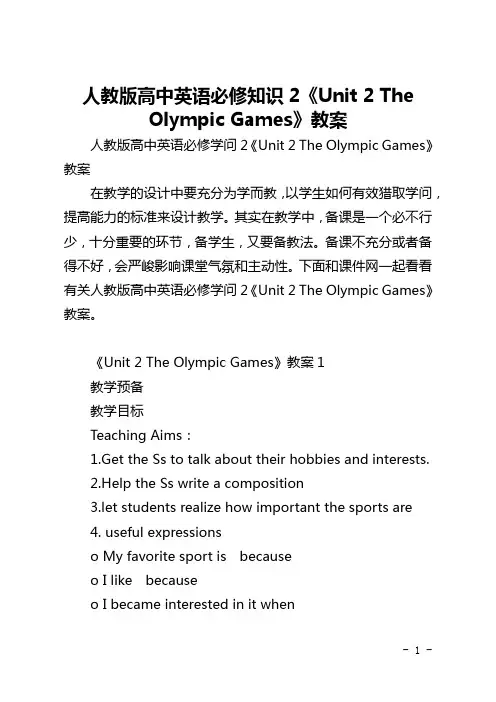
人教版高中英语必修知识2《Unit 2 TheOlympic Games》教案人教版高中英语必修学问2《Unit 2 The Olympic Games》教案在教学的设计中要充分为学而教,以学生如何有效猎取学问,提高能力的标准来设计教学。
其实在教学中,备课是一个必不行少,十分重要的环节,备学生,又要备教法。
备课不充分或者备得不好,会严峻影响课堂气氛和主动性。
下面和课件网一起看看有关人教版高中英语必修学问2《Unit 2 The Olympic Games》教案。
《Unit 2 The Olympic Games》教案1教学预备教学目标Teaching Aims:1.Get the Ss to talk about their hobbies and interests.2.Help the Ss write a composition3.let students realize how important the sports are4. useful expressionso My favorite sport is becauseo I like becauseo I became interested in it wheno My favorite athlete/footballer/sportsman iso I like him/her becauseo I practiseo In the future I hope to教学重难点Teaching Important Points:1.Get the Ss to talk about their hobbies and interests.2.Enable the students to write a compositionTeaching Difficult Points:1.How to talk about hobbies and interests.2.How to write a composition about their favourite sports.教学过程The General Idea of Th is Period:This period has two aimsto encourage the Ss to think and talk creatively about their hobbies and interests and to organize their ideas into a composition and to enable the students to write a report about their favou rit e sport.Teaching Aims:1.Get the Ss to talk about their hobbies and interests.2.Help the Ss write a composition3.let students realize how important the sports are4. useful expressionso My favorite sport is becauseo I like becauseo I became interested in it wheno My favorite athlete/footballer/sportsman iso I like him/her becauseo I practiseo In the future I hope toTeaching Important Points:1.Get the Ss to talk about their hobbies and interests.2.Enable the students to write a compositionTeaching Difficult Points:1.How to talk about hobbies and interests.2.How to write a composition about their favourite sports.Teaching Methods:1.Discussion in pairs and in groups.2.Practice.Teaching Aids:1.A multimedia computer.Teaching Procedures:Step 1 RevisionRead the words loudly and have a competitionStep2 lead inShow some picture in which the teacher is doing something she likes to arouse students interestStep3 pre-writingTask1:Making a Survey on Others Interests or HobbiesQ1:What is your favourite sport?S1:S2:S3:Q2:How you became interested in that sport:S1:S2:S3:Q4:What do you do to improve your skill?S1:S2:S3:Q5:Who is your favourite athlete? Why do you like him or her?S1:S2:S3:留意:1.划线部分的连接词是把不同的思想连接在一起。
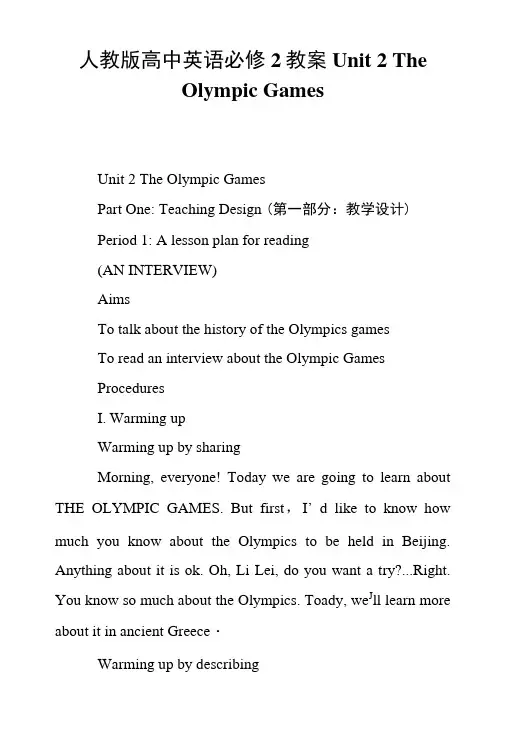
人教版高中英语必修2教案Unit 2 TheOlympic GamesUnit 2 The Olympic GamesPart One: Teaching Design (第一部分:教学设计)Period 1: A lesson plan for reading(AN INTERVIEW)AimsTo talk about the history of the Olympics gamesTo read an interview about the Olympic GamesProceduresI.Warming upWarming up by sharingMorning, everyone! Today we are going to learn about THE OLYMPIC GAMES. But first,I’ d like to know how much you know about the Olympics to be held in Beijing. Anything about it is ok. Oh, Li Lei, do you want a try?...Right. You know so much about the Olympics. Toady, we J ll learn more about it in ancient Greece・Warming up by describingNow, boys and girls・ I,11 show you a video show of the 28th Olympic Games・ Please tell me what it is about and describe it to the class・ Ok,Wang Lin, please describe it. Wonderful. That,s Liu Xiang. The hurdle king!Warming up by discussingHi, class・ You know our country is trying her best to prepare for the 2008 Olympic Games・ Every one is expecting and excited about it. Let" s discuss what we can do for it. And imagine what we will do at the 2008 Olympics.II. Pre-reading1.Asking and answeringNow, please read the three questions before the Reading. Let" s do it in turn. Let" s begin from the first row here...ok, you did a good job. Let" s summarize your answers・For reference:1.In Summer Olympics, there are running, swimming, shooting, wrestling, jumping, football, basketball, volleyball, table tennis, throwing, Javelin, weight lifting, gymnastics, boxing etc.In winter Olympics, there are skiing skating, ice hockey,ski jumping, sledding, snowboarding etc.2.The 29th Olympic Games will be held in Beijing on Auguster 18th, 2008.3.To hold the Olympic Games is a rich prize for a country. And it can make a country known in the world・ It can stimulate the country?s economy, and help to speed up its development.2.Imaging and introducingPlease look at the three pictures in the reading・ Please talk about them. Imagine whatever you can.For reference: The first picture is the status of a great Greek. His name is Pausanias. He was a famous traveler and writer in the second century AD. His Guide to Greece is an extremely comprehensive guidebook for tourists, concentrating on buildings, tombs and status and including a lot of information on the mythological, religious and historical background to the monuments described. It is so informative that it may be called the foundation of classical archaeology and this ancient Baedeker is still used as a guide to classical Greece・ Can you remember a famous ancient Chinese traveler and writer? He also wrote a book・ Yes, his name is Xu Shake・ His works is The Notes of Xu Shake? s travels.The second picture is the opening ceremony of the Olympic Games・Maybe this is the principle stadium. It,s large and can hold thousands of audience・The third picture is a Chinese athlete named Yang Yang. She won a gold medal for China in the 2002 winter Olympic Games・ She is a famous skating playe匸3.Talking and SharingWe know there are many differences and similarities about the ancient and modern Olympics. Do you know anything about them? You can simply高中英语。
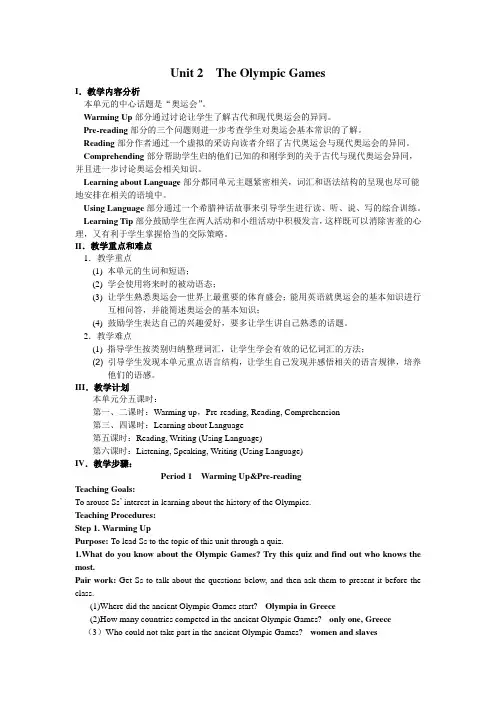
Unit 2 The Olympic GamesI.教学内容分析本单元的中心话题是“奥运会”。
Warming Up部分通过讨论让学生了解古代和现代奥运会的异同。
Pre-reading部分的三个问题则进一步考查学生对奥运会基本常识的了解。
Reading部分作者通过一个虚拟的采访向读者介绍了古代奥运会与现代奥运会的异同。
Comprehending部分帮助学生归纳他们已知的和刚学到的关于古代与现代奥运会异同,并且进一步讨论奥运会相关知识。
Learning about Language部分都同单元主题紧密相关,词汇和语法结构的呈现也尽可能地安排在相关的语境中。
Using Language部分通过一个希腊神话故事来引导学生进行读、听、说、写的综合训练。
Learning Tip部分鼓励学生在两人活动和小组活动中积极发言,这样既可以消除害羞的心理,又有利于学生掌握恰当的交际策略。
II.教学重点和难点1.教学重点(1) 本单元的生词和短语;(2)学会使用将来时的被动语态;(3)让学生熟悉奥运会—世界上最重要的体育盛会;能用英语就奥运会的基本知识进行互相问答,并能简述奥运会的基本知识;(4)鼓励学生表达自己的兴趣爱好,要多让学生讲自己熟悉的话题。
2.教学难点(1) 指导学生按类别归纳整理词汇,让学生学会有效的记忆词汇的方法;(2) 引导学生发现本单元重点语言结构,让学生自己发现并感悟相关的语言规律,培养他们的语感。
III.教学计划本单元分五课时:第一、二课时:Warming up,Pre-reading, Reading, Comprehension第三、四课时:Learning about Language第五课时:Reading, Writing (Using Language)第六课时:Listening, Speaking, Writing (Using Language)IV.教学步骤:Period 1 Warming Up&Pre-readingTeaching Goals:To arouse Ss’ interest in learning about the history of the Olympics.Teaching Procedures:Step 1. Warming UpPurpose: To lead Ss to the topic of this unit through a quiz.1.What do you know about the Olympic Games? Try this quiz and find out who knows the most.Pair work: Get Ss to talk about the questions below, and then ask them to present it before the class.(1)Where did the ancient Olympic Games start?Olympia in Greece(2)How many countries competed in the ancient Olympic Games?only one, Greece(3)Who could not take part in the ancient Olympic Games?women and slaves(4) When and where did the modern Olympic Games start?Athens in 1896(5 )Who was C hina’s first gold medal winner and for what event?Xu Haifeng for shooting(6) What are the three words that show the spirit of the Olympic Games?swifter higher stronger(7)What do the five rings on the Olympic flag stand for?the five continents(8)What are the official mascots for the Beijing Olympics?The five mascots are officially called the Five Friendlies.(9) How many gold medals did China win in the 29th Beijing Olympic Games? 51(10)What’s the motto of Beijing Olympic Games?One world, one dream2.Brainstorming:Name the events of the Olympic Games .Events of the Olympic GamesBoxing,Swimming,Cycling,Diving,Basketball,Badminton,Baseball,Archery,GymnasticsSailing, Horse riding, SoccerStep 2.Pre-readingPurpose: To have Ss learn about some more about Olympics and arouse their interest.Individual work: Get Ss to answer this question individually.1.Do you know any differences between the ancient and modern Olympic Games? List two of them.Ancient Olympic Games(1 )Only free citizens of one country take part(2 )Slaves and women could not take part(3) Always in the same place(4) Only once every four years(5 )Limited number of events which remained the sameModern Olympic Games(1) Competitors from many countries(2) All adults can take part if they reach the required standard for their event(3 )Hosted by different countries(4 )Summer and Winter Games; Special and Paralympics(5 )Many events which continue to increase2.When and where will the next Olympic Games be held?The next Olympic Games will be held in London in 2012.3.Show sth.about Beijing Olympic games.Homework:(1.)Write a passage about your idea about the Beijing 2008 Olympic Games in about 100 words.(2)Preview the reading: AN INTERVIEW课后记载:Period2 Reading1Teaching goals:1.train ss’ reading ability.2.let ss learn sth. about earthquake in tangshan.Teaching Procedures:Step1.Fast-ReadingListen to the tape and get the general ideas.This interview is mainly about ______.A. the story of a Greek writer Pausanias and a Chinese girl Li YanB. a magic journey by PausaniasC. the similarities and differences about the ancient and modern OlympicsD. the ancient Olympic Games in GreeceStep2.Careful-reading1. Where do all the competitors live?A. A hotel.B. A place hired by competitors.C. A restaurant.D. A special village.2. Which of the following is included in the Winter Olympic Games?A. Skiing and ice skating.B. Running and races.C. Horse riding.D. Swimming.3. Why do so many countries want to host the Olympic Games?A. To run faster, jump higher and throw further.B. To get a great honor.C. To make the country famous.D. To make money.4. Why does Pausanias think people may be competing for money in the modern Olympic Games?A. Because the winner can get medals.B. Because the winner can be awarded lots of money by their own countries.C. Because the olive wreaths have been replaced by medalsD. Because medals are made of gold.5. How does Pausanias feel when he hears the Olympic Games are also about being able to run faster, jump higher and throw further?A. Surprised.B. Happy.C. Sad.D. Astonished.Step3.Post-reading1.Scan the passage to find out the characteristics and similarities of the ancient and modern2.Read the passage carefully again and finish Ex2 (P11).(1).What amazes Pausanias about the Olympic Games?(2 )Why does he think Athens and Beijing should feel proud?(3) Why does he think people may be competing for money in the modern Olympic Games? Suggested Answers:(1) Pausanias is amazed that many countries take part in the Olympic Games and women too and there are two sets of Games-the Winter and the Summer Olympics.(2) Because Li Yan has explained that it is a great honour to host the Olympic Games..(3)He thinks that so many things have changed in the Olympic Games that he fears that the spirit of the Olympics may have changed too.3.Discussion:finish Ex3 (P11).Discuss this question in groups:Why do many countries want to host the Olympic Games while others do not? Use the mind map below to help you.(1)Reasons to host the Olympic Games?(2)Reasons not to host the Olympic Games?4.summary:Retell the text by filling the following blanks.The Olympic Games are the biggest sports meeting in the world, which include two kinds, the _________and the ________ Olympics. Both of them are ______ every ____ years. All countries can take part if their athletes reach the ________ to the games. Women are not only _______ to join in but playing a very __________ role.A special _______ is built for the competitors to live in, several ________ for competitions, a large swimming pool, a __________ as well as seats for those who watch the games. It’s a great _______ to host the Olympic Games. The olive wreath has been _________ by medals. But it’s still about being able to run ______, jump ______ and throw _______.Step4.Homework1.Read the text again and underline some important phrases and difficult sentences.2. Surf the Internet to find more stories about the ancient Greek and you are expected to share them with your peers in the next class.课后记载:Period 3 Language pointsTeaching goals:1. To enable Ss to master some new and useful words and expressions.2. To get Ss to have knowledge of language points.Teaching procedures:Step 1: Language pointsPurpose: To train Ss’ language capacity.1. Ss give the phrases and expressions according to the Chinese T gives2. Ss raise Qs on some difficult points they found while reading the textReading text:1.Take part in/join in 参加2.The spirit of ……精神、宗旨、灵魂ed to 过去常常4.Find out 查明,找出5.Every four years 每四年,每隔三年6.All over the world (遍及)全世界7. A set of 一套,一组pete with/against 和……竞争pete for…为……而竞争10.be admitted to 获准做某事11.be admitted as 作为…被接受12.reach the standard 达到……水平、标准13.play an important role/part in 在……方面扮演重要角色(起重要作用)14.as well as 和……一样15.think you for your time 感谢您(能抽空……)e from the same root 同根17.Have (no) chance of doing sth. 有(没)做……的机会18.Go with 伴随,与……搭配19.relate…to…把……与关联起来20.relate with 和……有关21.Run against…和……赛跑22.Hear of 听说23.Make sure 确定24.Take turns 轮流25.One after another 一个接一个1.go/start/ come/ be on a journey进行旅行eg.My father is away on a journey.find out about 弄清有关……的情况eg.The police are trying hard to find out about the accidenton a journey 在进行旅行on business 在出差2.interview sb. 采访/面试某人 a job interview 求职面试 a television interview 电视采访3.I lived in what you call “Ancient Greece”and I used to write about the Olympic Games more than 2,000 years ago. (P9)我生活在你们所说的“古希腊”,我曾经写过2000年前奥林匹克运动会的情况。
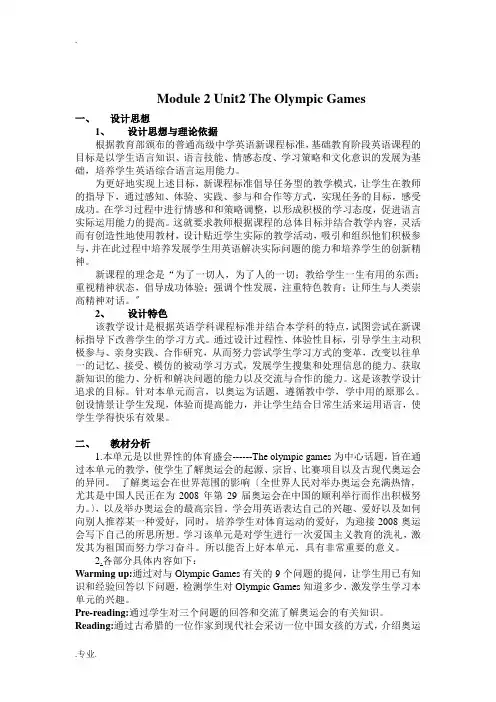
Module 2 Unit2 The Olympic Games一、设计思想1、设计思想与理论依据根据教育部颁布的普通高级中学英语新课程标准,基础教育阶段英语课程的目标是以学生语言知识、语言技能、情感态度、学习策略和文化意识的发展为基础,培养学生英语综合语言运用能力。
为更好地实现上述目标,新课程标准倡导任务型的教学模式,让学生在教师的指导下,通过感知、体验、实践、参与和合作等方式,实现任务的目标,感受成功。
在学习过程中进行情感和和策略调整,以形成积极的学习态度,促进语言实际运用能力的提高。
这就要求教师根据课程的总体目标并结合教学内容,灵活而有创造性地使用教材,设计贴近学生实际的教学活动,吸引和组织他们积极参与,并在此过程中培养发展学生用英语解决实际问题的能力和培养学生的创新精神。
新课程的理念是“为了一切人,为了人的一切;教给学生一生有用的东西;重视精神状态,倡导成功体验;强调个性发展,注重特色教育;让师生与人类崇高精神对话。
〞2、设计特色该教学设计是根据英语学科课程标准并结合本学科的特点,试图尝试在新课标指导下改善学生的学习方式。
通过设计过程性、体验性目标,引导学生主动积极参与、亲身实践、合作研究,从而努力尝试学生学习方式的变革,改变以往单一的记忆、接受、模仿的被动学习方式,发展学生搜集和处理信息的能力、获取新知识的能力、分析和解决问题的能力以及交流与合作的能力。
这是该教学设计追求的目标。
针对本单元而言,以奥运为话题,遵循教中学,学中用的原那么。
创设情景让学生发现,体验而提高能力,并让学生结合日常生活来运用语言,使学生学得快乐有效果。
二、教材分析1.本单元是以世界性的体育盛会------The olympic games为中心话题,旨在通过本单元的教学,使学生了解奥运会的起源、宗旨、比赛项目以及古现代奥运会的异同。
了解奥运会在世界范围的影响〔全世界人民对举办奥运会充满热情,尤其是中国人民正在为2008年第29届奥运会在中国的顺利举行而作出积极努力。
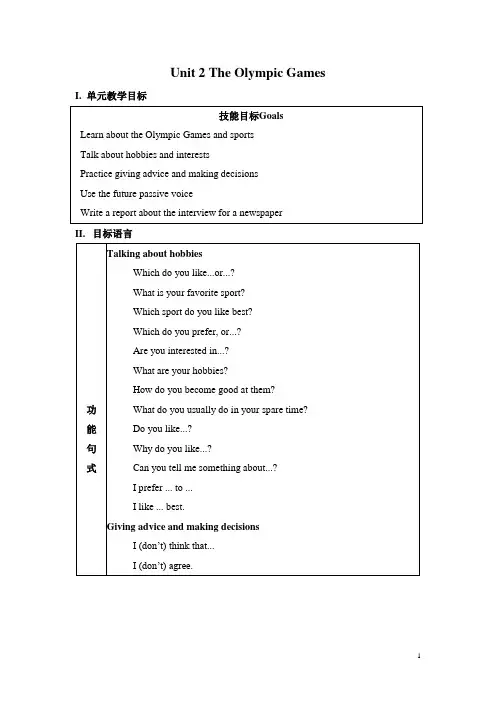
Unit 2 The Olympic Games I. 单元教学目标II. 目标语言III. 教材分析和教材重组1. 教材分析本单元以Olympic Games 为话题,旨在通过本单元教学,使学生了解奥运会的起源、宗旨、古代奥运会与现代奥运会的区别和相似之处以及比赛项目。
同时培养学生对体育运动的爱好。
在口语表达中,要求学生学会询问别人的兴趣爱好,以及如何向别人推荐自己的某一种爱好。
1.1 Warming Up通过对关于Olympic Games 的8个问题的提问,让学生根据对奥运知识的了解回答问题,目的在于激活同学们所了解的奥运知识,激发学生学习本单元的兴趣。
1.2 Pre-Reading通过学生对三个问题的讨论与交流,使他们了解奥运会有关知识。
1.3 Reading通过古希腊的一位作家到现代社会采访一位中国女孩的方式,介绍奥运会的有关知识,也让学生们了解了古代奥运会和现代奥运会的异同。
1.4 Comprehending是利用表格和问题的形式对文章进行分析,要求同学们找出古代与现代奥运会的异同点以及对文章内容细节的理解。
1.5 Learning about Language分词汇和语法两部分。
第一部分Discovering useful words and expressions 中的第一个练习,根据课文的上下语境的理解词意,写出英文解释所对应的单词。
第二个练习是要求同学们通过熟悉的近义词或短语来掌握课文中出现的新的词和短语。
第三个练习则是一篇小短文,要求同学们用所给的单词的正确形式填空。
第二部分Discovering useful structures则通过3 个练习来巩固同学们对将来时态的被动语态使用。
1.6 Using Language分为Reading and Listening,Speaking and Writing两部分。
Reading “The story of Atlanta”是一篇古希腊的故事。
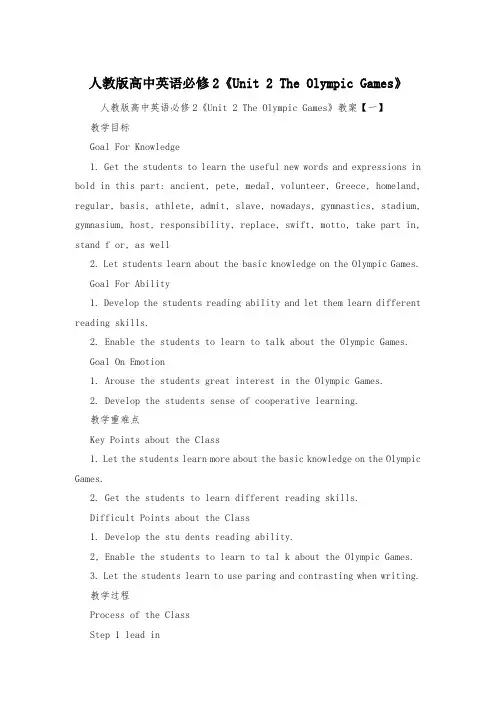
人教版高中英语必修2《Unit 2 The Olympic Games》人教版高中英语必修2《Unit 2 The Olympic Games》教案【一】教学目标Goal For Knowledge1. Get the students to learn the useful new words and expressions in bold in this part: ancient, pete, medal, volunteer, Greece, homeland, regular, basis, athlete, admit, slave, nowadays, gymnastics, stadium, gymnasium, host, responsibility, replace, swift, motto, take part in, stand f or, as well2. Let students learn about the basic knowledge on the Olympic Games. Goal For Ability1. Develop the students reading ability and let them learn different reading skills.2. Enable the students to learn to talk about the Olympic Games. Goal On Emotion1. Arouse the students great interest in the Olympic Games.2. Develop the students sense of cooperative learning.教学重难点Key Points about the Class1. Let the students learn more about the basic knowledge on the Olympic Games.2. Get the students to learn different reading skills.Difficult Points about the Class1. Develop the stu dents reading ability.2, Enable the students to learn to tal k about the Olympic Games.3. Let the students learn to use paring and contrasting when writing.教学过程Process of the ClassStep 1 lead in1. IntroductionAs we know, the ancient Olympic Games took place in Olympia in Greece every four years between 776BC and 339BC. Only men and boys could pete in the ancient Olympic Games. Married women were not even allowed to watch the Games; only young girls, boys and men could watch.However, in modern times, there are two main sets of Gamesthe Summer and Winter Olympics, and both are held every four years. Athletes from any country who have reached the agreed standard for their event will be admitted as petitors. Therefore, there are many significant differences between the modern and ancient Olympics, although certain similarities exist.In this text, Pausanias, an ancient Greek writer, has e on a magical journey to find out more about the ancient and modern Olympics. Has he got what he wants to know? I think you have got the answer. OK. First, lets do a survey about Olympics.Reflection:This part is to introduce the students to the text briefly to make the text easy for them to read.6. How many main kinds of the Olympic Games are there in the world?7. What is the motto of the Olympic Games?8. What is the host city of the first Olympics?9. What is the host city of the 202X Olympics?10. What is the host city of the 202X Olympics?Suggested keys:1-5 CBCDC6. Two. They are the Summer Olympic Games and the Winter Olympic Games.7. Higher, swifter and stronger.8. Athens, Greece.9. Athens, Greece.10. Beijing, China.Reflection:This part is to arouse the interests of the students on Olympic Games and get them into the reading slowly.Step 2 Pre-readingAsk the students to look at the title of the text and the pictures in it and talk about them.1) TitleAn InterviewAn interview is a meeting in which someone is asking another one some questions in order to find out about their actions or opinions.2) The first picture in the textThe first picture is the statue of a great Greek. His name is Pausanias. He was a famous traveler and writer in the second century AD.3) The second picture in the textThe second picture is a Chinese athlete named Yang Yang. She won a gold medal for China at the 202X Winter Olympic Games. She is a famous skating player.4) The third picture in the textThe third picture is the opening ceremony of the Olympic Games. Maybe this is the main stadium. Its large and can hold thousands of audience. See in the sky the five white rings? They are the Olympic Five Rings which stand for the five continentsAsia, Africa, the Americas, Europe and Oceania.Reflection:This step is to help the students make a further understanding of the text.Step 3 Readingprehending1 . Reading for the main ideaWhat does the passage mainly tell about?Suggested answer:This text mainly tells about the similarities and the differences between the ancient and modern Olympic Games.2. Reading for detailed informationAsk the students to read this text carefully to locate detailed information and then choose the best answer.1) Where do all the petitors live?A. A hotel.B. A special village.C. A restaurant.D. A place hired by petitors.2) Why do many countries want to host the Olympic Games?A. To run faster, jumper higher and throw further.B. To get a great honour.C. To make the country famous.D. To make money.3) Which of the following is included in the Winter Olympic Games?A. Skiing and ice skating.B. Running races.C. Horse riding.D. Swimming.4) The last Olympic Games were held in _________.A. BeijingB. AtlantaC. AthensD. Sydney5) Why does Pausanias think people may be peting for money in the modern Olympic Games?A. Because the winner can get medals.B. Because the winner can be awarded lots of money by their own countries.C. Because the olive wreaths have been replaced by medals.D. Because medals are made of gold.Suggested answers: 1)–5) BBACCReflection:This part is to check if the students have truly understood the text.3. Read the passage carefully and answer the following questions.1) What amazes Pausanias about the Olympic Games?2) Why does he think Athens and Beijing should feel proud?Keys:1) Pausanias is amazed that many countries take part in the Olympics and women too and there are two sets of Olympics.2) Its a great honour to host the Olympics.Reflection:This part is to enable the students to have a deep understanding of the text by answering some difficult questions.Keys:1. one2. women; slaves3. Greece4. two5. reached; agreed standard6. anywhere in the worldReflection:This part is to strengthen the key content in the text.5. Summary writing 归纳写作Answer these questions in not more than 100 words.回答下列问题,将答案组成一个段落,不要超过100个单词。
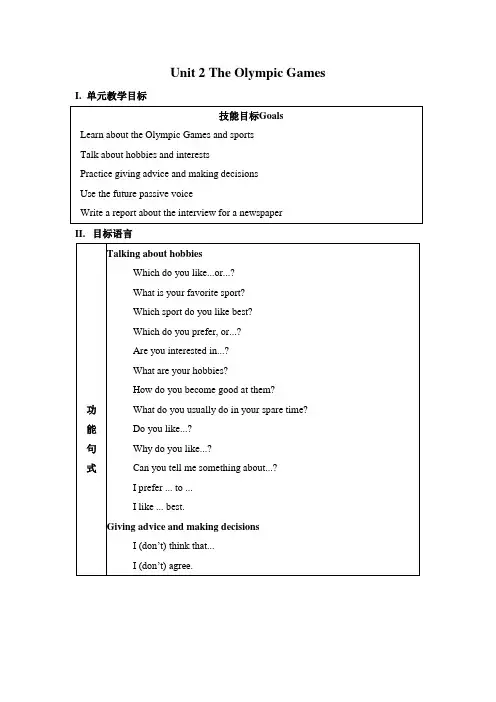
Unit 2 The Olympic Games I. 单元教学目标II. 目标语言III. 教材分析和教材重组1. 教材分析本单元以Olympic Games 为话题,旨在通过本单元教学,使学生了解奥运会的起源、宗旨、古代奥运会与现代奥运会的区别和相似之处以及比赛项目。
同时培养学生对体育运动的爱好。
在口语表达中,要求学生学会询问别人的兴趣爱好,以及如何向别人推荐自己的某一种爱好。
1.1 Warming Up通过对关于Olympic Games 的8个问题的提问,让学生根据对奥运知识的了解回答问题,目的在于激活同学们所了解的奥运知识,激发学生学习本单元的兴趣。
1.2 Pre-Reading通过学生对三个问题的讨论与交流,使他们了解奥运会有关知识。
1.3 Reading通过古希腊的一位作家到现代社会采访一位中国女孩的方式,介绍奥运会的有关知识,也让学生们了解了古代奥运会和现代奥运会的异同。
1.4 Comprehending是利用表格和问题的形式对文章进行分析,要求同学们找出古代与现代奥运会的异同点以及对文章内容细节的理解。
1.5 Learning about Language分词汇和语法两部分。
第一部分Discovering useful words and expressions 中的第一个练习,根据课文的上下语境的理解词意,写出英文解释所对应的单词。
第二个练习是要求同学们通过熟悉的近义词或短语来掌握课文中出现的新的词和短语。
第三个练习则是一篇小短文,要求同学们用所给的单词的正确形式填空。
第二部分Discovering useful structures则通过3 个练习来巩固同学们对将来时态的被动语态使用。
1.6 Using Language分为Reading and Listening,Speaking and Writing两部分。
Reading “The story of Atlanta”是一篇古希腊的故事。
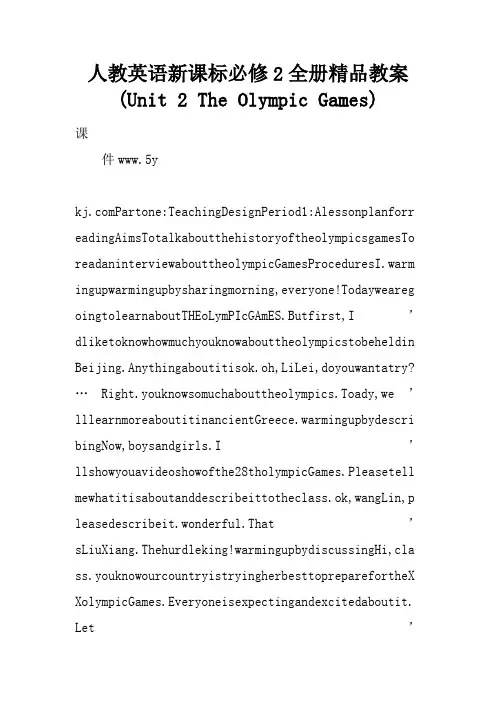
人教英语新课标必修2全册精品教案(Unit 2 The Olympic Games)课件www.5yPartone:TeachingDesignPeriod1:Alessonplanforr eadingAimsTotalkaboutthehistoryoftheolympicsgamesTo readaninterviewabouttheolympicGamesProceduresI.warm ingupwarmingupbysharingmorning,everyone!Todayweareg oingtolearnaboutTHEoLymPIcGAmES.Butfirst,I’dliketoknowhowmuchyouknowabouttheolympicstobeheldin Beijing.Anythingaboutitisok.oh,LiLei,doyouwantatry?…Right.youknowsomuchabouttheolympics.Toady,we’lllearnmoreaboutitinancientGreece.warmingupbydescri bingNow,boysandgirls.I’llshowyouavideoshowofthe28tholympicGames.Pleasetell mewhatitisaboutanddescribeittotheclass.ok,wangLin,p leasedescribeit.wonderful.That’sLiuXiang.Thehurdleking!warmingupbydiscussingHi,cla ss.youknowourcountryistryingherbesttopreparefortheX XolympicGames.Everyoneisexpectingandexcitedaboutit. Let’sdiscusswhatwecandoforit.Andimaginewhatwewilldoatth eXXolympics.II.Pre-reading1.AskingandansweringNow,p leasereadthethreequestionsbeforetheReading.Let’sdoitinturn.Let’sbeginfromthefirstrowhere…ok,youdidagoodjob.Let’ssummarizeyouranswers.Forreference:1.InSummerolympi cs,therearerunning,swimming,shooting,wrestling,jump ing,football,basketball,volleyball,tabletennis,thro wing,javelin,weightlifting,gymnastics,boxingetc.Inw interolympics,thereareskiingskating,icehockey,skiju mping,sledding,snowboardingetc.2.The29tholympicGame swillbeheldinBeijingonAuguster18th,XX.3.Toholdtheol ympicGamesisarichprizeforacountry.Anditcanmakeacoun tryknownintheworld.Itcanstimulatethecountry’seconomy,andhelptospeedupitsdevelopment.2.Imagingan dintroducingPleaselookatthethreepicturesinthereadin g.Pleasetalkaboutthem.Imaginewhateveryoucan.Forrefe rence:ThefirstpictureisthestatusofagreatGreek.Hisna meisPausanias.Hewasafamoustravelerandwriterinthesec ondcenturyAD.HisGuidetoGreeceisanextremelycomprehen siveguidebookfortourists,concentratingonbuildings,t ombsandstatusandincludingalotofinformationonthemythological,religiousandhistoricalbackgroundtothemonum entsdescribed.Itissoinformativethatitmaybecalledthe foundationofclassicalarchaeologyandthisancientBaede kerisstillusedasaguidetoclassicalGreece.canyouremem berafamousancientchinesetravelerandwriter?Healsowro teabook.yes,hisnameisXuShake.HisworksisTheNotesofXu Shake’stravels.Thesecondpictureistheopeningceremonyoftheo lympicGames.maybethisistheprinciplestadium.It’slargeandcanholdthousandsofaudience.Thethirdpicture isachineseathletenamedyangyang.Shewonagoldmedalforc hinaintheXXwinterolympicGames.Sheisafamousskatingpl ayer.3.TalkingandSharingweknowtherearemanydifferenc esandsimilaritiesabouttheancientandmodernolympics.D oyouknowanythingaboutthem?youcansimplyguess.yes,Luc y,try…III.Reading1.Readingaloudtotherecordingandfindingth egeneralideaNowpleaselistenandreadaloudtotherecordi ngofthetextANINTERVIEw.Payattentiontothepronunciati onandintonationaswellasthepauseswithineachsentence. Thentrytogetthegeneralideaofthepassage.Haveyougotth emainidea?yes,ittellsusthedifferencesandthesimilaritiesbetweentheancientandmodernolympics.2.Readingand actingNowlet’splaythepartsoftheGreekwriterPausaniasandthechinese girlLiLi.Nowboys,youarePausanias;girls,youareLiLi.P leasepayattentiontotheboldwords.3.Readingandfinding Nowreadthetextagain.Theboysshalltrytofinishthetask: whatwastheancientolympicslike?Thegirlsshalltrytofin ishthetask:whatisthemodernolympicslike?4.Readingand collectinginformationok,nowlet’sreaditsilently.Firstlet’stalkaboutthesamepointsbetweentheancientandmodernol ympics.whocananswer?Anyvolunteers?Thenlet’scometothedifferences.Thesimilarities①Bothareheldeveryfouryears.②Bothareheldnotformoneybutforhonour.③Thebeliefsarethesame.Theyare:Swifter,Higher,andstro nger.④menareallowedtotakepartbothinancientandmodernolympi cs.⑤Someeventsarethesame,suchasrunning,jumping,shooting andthowing.TheDifferences①Therewerenotwinterolympicsinthepast.②Nowcompetitorsarefromallovertheworld.Butintheancien ttime,onlythepeopleinGreececouldtakepart.③onlymenwereallowedtotakepartinthepast,nowwomanareal soallowed.④Inthepast,winnersgottheolivewreathastheprize.Nowcom petitorscompeteformedals.⑤Theeventsandathletesinmoderntimearemorethanthoseint hepast.⑥Thereisaspecialvillageforthecompetitorstolivein,ast adiumforcompetitions,agymnasiumforthesewhowatchtheg amesnow.Buttherewerenotinthepast.)5.Readingandunder liningNextyouaretoreadandunderlinealltheusefulexpre ssionsorcollocationsinthepassage.copythemtoyournotebookafterclassashomework.collocationsfromANINTERVIE wtakepartin…,goldmedals,thespiritof…,beheld,inord erto,hosttheolympicGames,onamagicaljourney,findout, thepresentdayolympicGames,usedto,writeabout…,comet oyourtime,beadmittedas…,twosetsof…,enjoycompeting in…,competeagainst…,forthehonourof…,reachthestan dard,beadmittedto…,playaveryimportantrole,aswellas ,astadiumforcompetitions,asamatteroffact,competefor …,olivewreath,feelproudof…,make…happyⅣclosingdownclosingdownbydoingexerciseToendthelesson youaretodothecomprehendingexercises1&2.closingd ownbydiscussingyouknowourgovernmenthastrieditsbestt ocompeteforhostingthe29tholympicGames.Ithascostalot ofmoney.Doyouthinkitisworthwhile?why?Forreference:I tisworthwhiletohosttheolympicGames.TohostolympicGam escanmakeourcountryknowntothewholeworld.Tohostolymp icGamescanmakeourcultureandpeopleunderstoodbytheoth erpeoples.TohostolympicGamescanstimulatethedevelopi ngofoureconomy.closingbyimaginingImaginewhatwewilld oandwhatwecandoforthe29tholympicGamesnow.Forreferen ce:maybewecanserveasvolunteerstohelptheforeignvisit orsandathletesfromallovertheworld.Soatpresentweshouldstudyhard.EspeciallyweshouldtryourbesttolearnEngl ishwell.closingdownbynarratingwecanseethetextiswrit teninaconversationalstyle.Andtherearetwospeakers.on eisPausanias,aGreekwriterXXyearsago,theotherisLiLi, achinesegirl.Nowlet’schangeitintoanarrativestyle.Inotherwords,let’sdescribetheancientandmodernolympicGamesinourownwor ds.whowouldliketohaveatry?Forreference:Theancientol ympicGamesbeganinGreeceandwereheldfrom776B.c.toA.D. 393.Itwasheldeveryfouryears.Atthattime,therewerenot somanysportsastoday.Andwomenwerenotallowedtotakepar tinthegames.Therewerenotwinterolympicsatthattime.wi nnersgottheolivewreathastheprize.Themottowasswifter ,higherandstronger.ThemodernolympicGamesbeganin1891 .They’reheldeveryfouryears.Therearemanynewsportsintheolym pics.Inthesummerolympicsthereareover250differentspo rts.womenarenotonlyallowedtojoininbutalsoplayaveryi mportantrole.Nowthecompetitorscompeteformedals.Them ottoisswifter,higherandstronger.closingdownbysummar izingAswehavefinishedthepassagewe’llsumupwhatwehavelearned.Firstlet’sseethewritingskills.Itiswritteninaconversationalst yle.It’sinaveryinterestingway.ItadoptsadialoguebetweenPaus aniaswholivedXXyearsagoandachinesegirdinmodernworld .Throughtheirdialogue,thedifferencesandsimilarities betweentheancientandmodernolympicGamesaremadeknownt othereaders.justbecauseitisinaconversationalstyle,t herearequiteafeworalspokenEnglishandellipticalphras es.Throughthecomparisonbetweentheancientandmodernol ympicGames,wehavelearnedthedifferencesandthesimilar itiesbetweenthem.Nowwecanhaveadeepunderstandingofth eGames.Fromthepassage,wecanhaveadeepunderstandingof theGames.Fromthepassage,wecanalsogettoknowthattheol ympicGamesaredevelopingandimproving.It’sourdutytomaketheolympicGamesbetterandhealthier.wek nowthatoneoftheslogansforXXBeijingolympicGamesisGre enolympicGames.Itshowsthatpeoplearepayingmoreandmor eattentiontoourenvironment.Period2:AlessonplanforLe arningaboutLanguageAims:TolearnaboutfuturepassivevoiceTodiscoverusefulwords andexpressionsTolearnthemethodsofwordsformationProc eduresI.warmingupwarmingupbydictatingThereareseveralimportantsentencesinthisunit.Let’sdictatethem.Ifyoucan’t,learnthembyheartafterclass.①whenandwherewillthenextolympicGamesbeheld?②Iliveinwhatyoucall“AncientGreece”and/usedtowriteabouttheolympicGamesmorethanXXyearsa go.③Allcountriescantakepartiftheyreachthestandardtobead mittedtothegames.④ThenextolympicGameswillbeheldinmyhometown.⑤Itisjustasmuchacompetitionamongcountriestohosttheol ympicsastowinanolympicmedal.warmingupbydiscoveringu sefulwordsandexpressionsTurntopage11anddoexercises1 ,2,3and5first.checkyouranswersagainstyourclassmates ’.II.Learningaboutwordformation1.Doexercise4anddis covertherules.Turntopage12andfindouttherulesofwordf ormation.Byadding-ingtoaverb,wecanchangetheverbinto anoun.Thatmeanswecanchange“doingsomesport”into “thenameofthesport”.Byadding-ertoaverb,wecanchang etheverbintoanoun.Thatmeanswecanchange“doingsomesport”into “thepersonwhodoesthesport”.2.meansofword-formatio ningeneralAffixation,conversion,andcompositionareth echiefmeansofword-formationinEnglish.Besidesthese,t herearealsootherminorwaysofword-formationincludingc lipping,acronymy,blendingetc.III.LearningaboutPrese ntFuturePassiveVoiceTurntopage13anddoexercise3.Andt elltheclasstheformationofpresentfuturepassivevoice. Forreference:welldone,class.wecanfollowthefollowing formlationtoturnthefuturetensesintofuturepassivevoi ce;begoingtobedone,beabouttobedone,betobedone,will/ shallbedone,would/shouldbedone.Ⅳclosingdownbysummarizing1.Presentfuturepassivevoice AffirmativeNegativeInterrogativeIyouHe/she/itwill beaskedwewillyou/TheywillIyouHe/she/itwillnotbeaskedwewillnotyou/TheywillnotwillIwillyouwillhe/s he/itbeaskedwillwewillyou/they2.ThepassiveVoiceofphrasal verbGenerallyspeaking,onlytransitiveverbscanformthe passivevoice,foronlytransitiveverbscanbefollowedbyobjects.Butmanyintransitiveverbstogetherwithsomeprep ositionsandadverbscanbeusedastransitiveverbs.Sothey canalsobefollowedbytheobjects.Thereforetheycanalsob eusedinpassivevoice.Butnotethatallthephrasalverbsar eusedasawhole.whenusingtheminpassivevoice,wecannotd ropouttheprepositionsandadverbs.Forexamples:Atlastt heyputoutthefire.Atlastthefirewasputout.Theywillputupanoticeonthewal l.Anoticewillbeputuponthewall.Haveyousentforadoctor?Hasthedoctorbeensentfor?Ihaveneverheardofsuchathing before.Suchathinghasneverbeenheardofbefore.wemusttakegoodc areofthechildrenhere.Thechildrenmustbetakengoodcareofhere.Hisclassmatesl aughedathimforthefoolishmistake.Hewaslaughedatforthefoolishmistakebyhisclassmates.P eriod3:AlessonplanforusinglanguageAims:Toreadaboutt heancientolympicGamesTolistenandtalkabouthobbiesTow riteabouthobbiesProcedures1.warmingupwarmingupbyint roducingHi!class.youknowGreeceistheworld-knowncount rywithanancientcivilization.Ithasalonghistorywithso muchmarvelousculture.TheGreekshadwonderfulstoriesab outtheGodsandGoddnesseswhowerepartoftheirreligion.T heybelievedthatthesegodorgoddesseswouldhelphumansif theyfeltsorryforthemorifthehumansweregoodpeople.How ever,theGodsdidnotalwayshelp.Theybehavedlikepeoplew howereunpredictableandcapricious.Totrytogetthesuppo rtoftheGodspeoplehadtopraytothemandofferthempresent .InthisstorytheGoddessHera,thewifeofthechiefGod,Zeu swassorryforHippomenesandagreedtohelphim.warmingupb ysharingNow,boysandgirls.Isthereanybodywhocantellus someGreekmythology.youknowtheyaresofamousinhumanhis tory.orcanyouspeakoutsomenamesofGreekGodsandGoddess es.Prometeus普罗米修斯——asonoftheformerchiefGodSphinx斯芬克斯——abeingwithahumanfacebutalionbodyPandora潘多拉——abeautifulgirlwitheveryillandevilthoughtanddeedZeus宙斯——thechiefGodwhogovernedtheworldHera天后——thewifeofZeuswhogovernedtheloveⅡ.Guidedreading1.ReadingandjudgingReadthetextTHEST oRyoFATLANTA,andcompletetheTrueorFalseguestionsafte rthetextonpage14.2.ReadingandansweringReadthetextag ain,andanswerthefollowingquestions.A.whatwasAtlanta’sproblem?B.whatwereAtlanta’srules?c.whatwasHippomenes’amazement?D.whatmadeHippomeneschangehismind?E.whomd idHippomenesturntoforhelp?F.canyouguesswhatwastheen ding?Forreference:A.Atlantacouldrunfasterthananymen inGreece.ButshewasnotallowedtorunintheolympicGames. B.Shepromisedtobemarriedtoamanwhocouldrunfasterthan her.Ifhecouldnotrunasfastasher,hewouldbekilled.c.Hi pppomenescouldnotunderstandwhysomanyyoungmenwantedt orisktheirlives.D.Atlanta’sbeautymadehimunderstandhisamazementandchangehismin d.E.HeturnedtotheGoddessofloveforhelp.F.Hippomenesw askilledbecauseoflosinghisrace.G.HeranfasterthanAtl antaandmarriedher.3.ReadingandunderliningNextyouare toreadandunderlinealltheusefulexpressionsorcollocat ionsinthepassage.copythemtoyournotebookafterclassashomework.collocationsfromTHESToRyoFATLANAbeallowedt o,runagainst…,willbepardoned,hearof…,beamazed,asf astas…,changeone’smind,ask…forhelpfrom…,promiseto,willberelaxed,pickup,beconf identabout…,shareone’spain,runpast…,competewith…,cheaptomarry4.Listeni ngForlisteningturntopage15andbereadytodoexercises1. Firstreadthequestionscarefullyandimaginewhatistheli steningabout.whendoingexercise2,youmustmakeclearwha tiswrongwiththesentence.Andtelltheclasswhichiscorre ct,whichiswrongandwhichisonlyhalftrue.5.ActingNextw earegoingtoputthetextASToRyoFATLANTAonstage.youknow therearefourcharactorsinthestory.whowouldliketobeth em?whowillbeAlanta’sfather,theoldking?whowillbetheGoddessofLove?ok.LiL i,youaretheGreekprincess.ZhangQiang,youarethebravey oungmanHippomenes.Lucy,youaretheGoddessofLove.ZhouG ang,youaretheprincess’sfather.Therestofclass,pleaseprepareitingroupsoffou r.Thenactyourplaybeforeclass.AtextplayofTHESToRyoFA TIANTATime:onemorninginspringPlace:atthepalacePeopl e:theoldking,theprincess,theyoungman,theGoddessoflove.F:mydeardaughter,youseehowbeautifulthespringis!youare justlikethespringflowers.whydon’tyoumarry?Somanyyoungkingsandprincesswanttomarryyou ,andtheyareallsorich,smartandnice.A:oh,dearfather.IhavepromisedthatIwillonlybemarriedto amanwhocanrunfasterthanme.Iwillrunagainsthim.Ifheca nnotrunasfastasme,hewillbekilled.Noonewillbepardone d.F:But,mydeardaughter.Nomanhaswonyou.Theyallsentthemse lvestodeath.whenwillyougetmarried?A:Iwon’tmarryunlessIamallowedtorunintheolympicGames.H: oh,mykindestkingandmyprettiestprincess!I’llmarrytheprincess.I’llcompetewithyou.A:Doyouknowtherules?H:yes,princess!F:oh,youngman!Goaway!youcan’twinher.youareonlylosingyourlife!H:No,Iwantatry!F:Foolishthing!Goaway!Don’tgotodie!L:oh,youngman,what’sthematter?whyareyousosad?H:oh,myGoddess,canyouhelpme?canyouhelpmetowintheprinc essandmarryher?L:ok,youngman.Doyoureallywanttomarryherandloveher?H: ofcourse.Sheissobeautiful.L:ok,itiseasy.Takethesethreegoldenapples.ThrowapplesinfrontofAtlantawhensheisrunningpastands hewillberelaxed.whenshestopstopickitup,youwillbeabl etorunonandwin.H:oh,thankyou,myGoddess!k:well,youngman,whyareyouhereagain?H:mykindestking.Iwanttomarryherandrunagainsther!k: well,youngman.Irepeat.Don’tbesilly!Goaway!H:No.Iloveher.Iwillmarryher-ordie!6.SpeakingNow,class.Let’scarryoutasurveyoftheinterestsintheclassandwritedownthenamesoftheclassmateswhohavethesameinterests.you cancarryoutthetasklikethis.whichdoyoulike,sport,musicorcollection?whichofthesportsdoyoulikebest?whatisyourfavoritesport?Areyouinterestedintabletennis?Afterthesurvey,theoneswhohavethesameinterestssittog etherandpleaseworkingroupsoffourtotalkabouttheirint erest.whydoyoulikethissport/music/collection?whendo youbegintolikeit?what’senjoyableaboutthehobby?whathaveyoulearnedfromtheho bby?III.Guidedwriting1.writinganimagineddialogueGro ups1and2aregoingtowriteanimagineddialoguebetweenthe princessandHippomenes.youmaybeginlikethis:oh,mydear princess,Iwanttomarryyou…2.writingadescriptionTurntopage16andfollowthedirect iontowriteadescriptionofyourfavoritehobby.Hereisane xample:Swimmingismyfavoritesport.Ilikeitbecauseitca nbringmemuchfun.Theprocessoflearningswimmingisveryi nteresting.youcantrydifferentwaysofswimming,suchasb reaststrokeandbackstroke.youcanswimatanytimeoftheyearifyoulike.Inhotsummer,ifyoujumpintotheriverorthes eatohaveaswim,you’llfeelcoolandcomfortable.Evenincoldwinter,youcanswi mifyouarebraveenough.It’sahealthysportanditcanbuildupyourbody.Ifyouareabegi nner,youmustbecareful.you’llbetternotswimaloneandbringlifebuoywithyouincaseof danger.Ifyouwanttobeagoodswimmer,youmusthavealotofp racticeandhavegreatdetermination.IV.closingdownbyfi ndinginformationGotothelibrarytoreadorgetonlinetose archinordertofindmoreinformationontheolympicGamesan dtheancientGreekmythology.Takenotesofyourfindingand reporttoyourgroupmatesnextmondaymorning.PartTwTeach ingResourcesSection1:ThewritingstyleofthereadingANI NTERVIEwTypeofwritingconversationalstylemainideacom paringthedifferencesbetweenAncientandmodernolympics characteristicsBycomparingandcontrastingSection2:Ba ckgroundinformationontheolympicGamesI.Eventsofthemo denolympicGamesArchery,Baseball,Badminton,Basketbal l,Beach,Volleyball,Boxing,canoe/kayak,cycling,Divin g,Equestrian,Fencing,FieldHockey,Gymnastics,Handbal l,judo,modernPentathlon,Rowing,Sailing,Shooting,Soccer,Softball,Swimming,SynchronizedSwimming,TableTen nis,Tennis,Taekwondo,Track&Field,Triathlon,Voll eyball,waterPolo,weightlifting,wrestlingII.olympicT raditionsTheolympicAnthemTheolympicanthemwaswrittenbytheGreeknationalpoetcos tisPalamasandcomposedbyGreekmusicianSplrosSamaras.I twasfirstsungatthe1896Games.TheIocadopteditastheoff icialolympicanthemtocrownolympicceremoniesatthe1958 IocSessioninTokyo.TheolympicmottoTheolympicmotto“swifter,higher,stronger”comesfromthreeLatinwords”citus,altius,fortius”,whichactuallymean”faster,higher,braver”.TheFrencheducator,BaronRerre decoubertin,whorevivedtheancientolympicGamesandin18 96ledthefirstmodern01ympicGamesinAthens,borrowedthe phrasefromaDominicanpriestHenriDinon.mr.Dinonintrod ucedthesewordswhilepresentingathleticprizesatacolle gein1891.Buthowdidthesewordsbecomethemottooftheolym picGames?ItwasmichelBrealwhointroducedthisphraseatt heclosingdinnerofthecongressforthereestablishmentof themodernolympicGamesonjune23,ter,theInternationalolympiccommitteeformallyadoptedthisphraseasth eofficialmottooftheGames.TheolympiccreedTheolympiccreedwasalsointroducedatthe1896Games.Asst atedbyPierredecoubertin,thecreedisasfollows:”ThemostimportantthingintheolympicGamesisnottowinbut totakepart,justasthemostimportantthinginlifeisnotth etriumphbutthestruggle.Theessentialthingisnottohave conqueredbuttohavefoughtwell.”TheolympicFlagItwasPierredecoubertinwhoconceivedthe ideaoftheolympicflagwithfivecolouredinterlockingrin gsonawhitebackround.Theringsrepresenttheunionofthef ivecontinentsandthemeetingoftheathletesfromallaroun dtheworldattheolympicGames.Today,almostacenturyaftertheflag’screation,thesixcolours,thoseoftheringsandthatofthe whitebackgroundwhichstandsforpeace,stillmaintainthe irsymbolismandcanbefoundinflagsacrosstheworld.Theol ympicflagwasfirstusedduringtheAntwerpGamesin1920.Th eolympicoath“Inthenameofallthecompetitors,IpromisethatweshalltakepartintheseolympicGames,respectingandabidingbyth eruleswhichgovernthem,inthetruespiritofsportsmanshi p,forthegloryofsportandthehonourofourteams.”AttheopeningceremonyofeachGames,oneathletefromtheho stcountrytakesolympicoathonbehalfofallcompetingathl etes.Thisparticulargestureofsports-manshipwasintrod ucedatthe1920GamesinAntwerp,Belgium.Acoachorteamoff icialtakesasimilaroathateachopeningceremony.Theolym picFlameTheolympicflameisoneofthemostvisiblesymbols ofthemodernGames.ItstraditionhassurvivedfromtheGame sofancientGreece,whereasacredflame,ignitedbythesun, burnedcontinuallyonthealtarofthegoddessHera.Themode rnolympicflamewasfirstlitin1928attheAmsterdamolympi cGames,whereitburnedthroughoutthecompetitions.Ithas becomeamajorsymbolforsolidarityamongnationsandembod iestheolympicspiritencompassingtheidealsofpurity,th eendeavourforperfection,thestruggleforvictory,frien dshipandpeace.TheTorchRelayDuringthe1896GamesinAthe ns,younginspiredsportsmenhadorganisedthefirsttorchr elays.However,thetraditionoftheolympictorchofficial lybeganattheBerlinGamesin1936.Asinancienttimes,thetorchislitbythesuninAncientolympia,thenpassedfromrun nertorunnerinarelaytothehostcity,whereitisusedtolig httheolympicStadium’sflameduringtheGames’openingceremony.Theflamethenburnsuntilitisextinguis hedattheclosingceremony.Section3:wordsandexpression sfromunit2THEoLymPIcGAmEShonestadj..notdisposedtocheatordefraud;notdeceptiveorfrau dulent:honestlawyers2.markedbytruth:givehonestanswe rs3.withoutpretensions:workedatanhonesttrade4.without dissimulation;frank:myhonestopinion5.habituallyspea kingthetruth:anhonestman6.worthyofbeingdependedon:anhonestworkingstaff7.freefromguile:Hisanswerwassimpleandhonestancienta dj..veryold:anancientmariner2.inoroftimeslongaganc ientRomeandGreece3.havingexistedsinceaveryearlytime :ancienthistory/customscompetev.totrytowinsth.incompetitionwithsomeoneelse:johncompetedforaplaceattheirschool,butdidn’tgetit.competeforsomething;engageinacontest;measureoneself againstothersmedaln.anawardforwinningachampionshiporcommemoratingsomeot hereventhostn.amanwhoreceivesguests:Heactedashostto hisfather’sfriends.chinaisthehostcountryforXXolympicGames.v.bethehostoforfor:wehosted4coupleslastnight.magicala dj.possessingorusingorcharacteristicoforappropriatetos upernaturalpowers:amagicalspellinterviewn..thequestioningofaperson;oftenconductedbyjourna lists:myinterviewswithteen-agersrevealedaweakeningo freligiousbonds.2.aconferencev..conductaninterviewintelevision,newspaper,andra dioreporting2.discussformallywithforthepurposeofane valuation:weinterviewedthejobcandidates.3.goforanin terviewinthehopeofbeinghired:Thejobcandidateinterviewedeverywhere.athleten.apersontrainedtocompeteinsportsadmitv..allowparticipationinortherighttobepartof;permi ttoexercisetherights,functions,andresponsibilitieso f:admitsomeonetotheprofession2.allowtoenter;grantentrytwecannotadmitnon-membersint oourclub.3.serveasameansofentrance:Thisticketwillad mitoneadulttotheshow.4.giveaccessorentrancetTheFren chdoorsadmitontotheyard.5.affordpossibilitye:Thispr oblemadmitsofnosolution.6.declaretobetrueoradmitthe existenceorrealityortruthof:Headmittedhiserrors.7.a dmitintoagrouporcommunity:we’llhavetovoteonwhetherornottoadmitanewmember.8.haver oomfor;holdwithoutcrowding:Thetheateradmits300peopl e.replacev..putsomethingbackwhereitbelongs:Replacethebooko ntheshelfafteryouhavefinishedreadingit.2.substitute apersonorthingfor:Hereplacedtheoldrazorblade.3.putintheplaceofanother;switchseeminglyequivalenti tems:TheconartistreplacedtheoriginalwithafakeRembrandt.4.taketheplaceormoveintothepositionof:Smithrepl acedmillerascEoaftermillerleft.relatev..haveorestablisharelationshiptSherelateswelltoh erpeers.2.beinarelationshipwith:Howarethesetwoobser vationsrelated?3.giveanaccountof:Thewitnessrelatedt heevents.4.havetodowithorberelevantto5.makealogicalorcausalconnection:Icannotrelatethese eventsatall.sailn..alargepieceoffabricbymeansofwhichwindisusedtop ropelasailingvessel2.anoceantriptakenforpleasure v..traverseortravelbyshipon:wesailedtheAtlantic2. travelinaboatpropelledbywind:Ilovesailing,especiall yontheopensea.3.travelbyboatonaboatpropelledbywindo rbyothermeans:TheQE2willsailtoSouthamptontomorrow.4 .movewithsweeping,effortless,glidingmotions:Shredso fpapersailedthroughtheair.advertisev..callattentiontPleasedon’tadvertisethefactthathehasAIDS.2.makepublicityfor;t rytosellpromisen..groundsforfeelinghopefulaboutthefuture:Thereislittleornopromisethathewillrecover.2.averbalcommitm entbyonepersontoanotheragreeingtodosomethinginthefu turev..givegroundsforexpectations:Theresultspromisedf ameandglory.2.makeapromiseorcommitment3.promisetoun dertakeorgive:Ipromiseyoumybesteffort.4.makeapredic tionabout;tellinadvance课件www.5y。
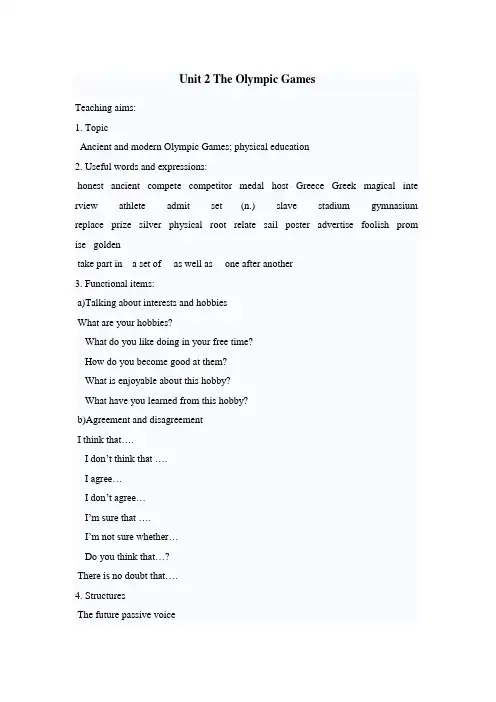
Unit 2 The Olympic GamesTeaching aims:1. TopicAncient and modern Olympic Games; physical education2. Useful words and expressions:honest ancient compete competitor medal host Greece Greek magical inte rview athlete admit set (n.) slave stadium gymnasium replace prize silver physical root relate sail poster advertise foolish prom ise goldentake part in a set of as well as one after another3. Functional items:a)Talking about interests and hobbiesWhat are your hobbies?What do you like doing in your free time?How do you become good at them?What is enjoyable about this hobby?What have you learned from this hobby?b)Agreement and disagreementI think that….I don’t think that ….I agree…I don’t agree…I’m sure that ….I’m not sure whether…Do you think that…?There is no doubt that….4. StructuresThe future passive voiceWhen and where will the next Olympic Games be held?The 2008 Olympics will be held in China.Teaching proceduresPeriod 1 (Reading)Step 1. Warming up1. Show the Ss the video of the opening ceremony of the 28th Olympic Games held in Athens on August 14th, 2004.2. Ss say something about the Olympic Games.3. Ss finish the chart on page 9.Step 2. Pre-reading1. Let the Ss discuss the three questions in pre-reading.2. Collect answers from the Ss.Step 3. While-reading1. First listen to the tape, paying attention to pronunciation and intonation, and try to get the general idea of the passage.(It tells us the differences and the similarities about the ancient and modern Olympics.)2. Ss read the passage and answer the following questions:1). What upsets Pausanias about the modern Winter Olympic Games?2). What amazes Pausanias about the modern summer Olympic Games?3). Why does Pausanias think Athens, Greece and Beijing, China should feel proud?4). Why does Pausanias think people may be competing for money in the modern Olympic Games?5). What makes Pausanias happy about the modern Olympic Games?3. Ss read the whole passage and fill in the table on page 11.Step 4. After-reading1. Ss discuss what they have learned.Suggested answer:Through the comparison between the ancient and modern Olympic Games, we have learned the differences and the similarities between them. Know we can have a deep understanding of the games. From the passage, we can also know that the Olympic Games are developing and improving. It’s our duty to make the Olympic games better and healthier. We know that the principal in 2008 Beijing Olympic Games is Green Olympic Games. It shows that people are paying more and more attention to our environment. In the coming Olympic Games, what will you do?2. Ss discuss: what will you do for the coming 2008 Beijing Olympic Games? Homework1. Recite the key sentences in the text.2. Retell the text.Period 2. (Language learning and grammar)Step 1. RevisionSs try to retell the text, using their own words.Step 2. Language points1. host (v.)2. are to be held3. admit (v.) admitted admittedbe admitted to be admitted as4. as well as5. marry sb. be/get married to sb.6. make sure thatStep 3 Discovering useful words and expressions1. Ss read the text and finish exercise 1 and 2 on page 11 and 12.2. Ss read the passage on page 12, part 3 and try to complete it with appropriate words.3. Ss do exercises 4 and 5 on page 12.Step 4. Grammar: The future passive voice1. Show the Ss the following sentences, then change them into passive voice.1). I do my homework.2). I have finished my homework.3). I am doing my homework.4). I will do my homework.The basic form of the passive voice: be + P.P.1. Ss read the sample on page 13 first and make one poster by themselves using the passive voice.2. Ss finish the rules for the Olympic Games on page 13.Step 5. PracticeSs do Wb using structures: exercise 2 on page 50.Homework1. Review what they have learnt about the future passive voice.2. Finish Wb exercises 1 and 2 on page 49.3. Finish using structures, exercise 1 on page 49.Period 3. Extensive ReadingStep 1. RevisionCheck Ss’ homework.Step 2. Reading (P14)1. Ss listen to the tape to get the general idea.The main idea:The story is about a princess who races to marry the man that can run faster than her. In order to win the race, a man asks for help from the Goddess of Love.2. Ss read and finish True of False questions.3. Check the answers.Step 3. Reading (page 51)1. This reading material includes three different topic about the ancient OlympicGames. Now read the first part and tell the main idea of it.The main idea:It describes the opening ceremony of the ancient Olympic Games.2. Ss read the second part and the third part and get the main ideasMain idea for the second part:It tells us the training life of a successful athlete and the records that he got for winning the match.Main idea for the third part:A woman was discovered in the Olympic Games. She aroused some argument. A law was passed that women were not allowed to take part in the Games.3. Ss read again and fill the form on page 52.HomeworkFind the sentences which use the future passive voice from the passage.Period 4. ListeningStep 1. revisionCheck the homework1. I will only be marries to a man who can run faster than me.2. If he can’t run as fast as me, he will be killed.3. No one will be pardoned.4. Why will they let themselves be killed?5. Throw an apple in front of Atlanta when she is running past and she will be relaxed.Step 2. Listening (page 15)1. Ss are asked to read fast the sentences in part 2 to get the general idea to choose the best answer.2. Listen to the tape again to number the events.3. Listen to the tape again and pause at key sentences. Then check the answer.Step 3. Listening task (page 51)1. Ss read the sentences in part 1 quickly.2. Play the tape three times and check the answer.Step 4. Listening (page 48)1. Teacher can say something about marathon.2. Ss listen to the tape and answer the questions on page 48.Homework1. Finish part 2 on page51.2. Read the listening material after class.Period 5. SpeakingStep 1. RevisionCheck the homeworkStep 2. Speaking (page 15)1. Get the Ss carry out a survey of the interests in the class and write down the names of the Ss who have the same interests.2. The Ss who have the same interests sit together and work in groups of four to talk about their interest.3. Ask some groups to act their dialogue out.Step 3. Talking (page 48)Now turn to page 48. Look at the requirements first to know what you should do. Do you agree with this idea? Give your opinions using the following expressions.I think that…I don’t think that…I agree…I don’t agree…I’m sure that….I’m not sure whether…..There is no doubt that ….Do you think that…?Step 4. speaking (page 52)1. Divide the class into groups of three. Ss discuss their training plan.2. Ss write their training plans in the form on page 53.Period 6. WritingStep 1. Pre-writingSs read the requirements on page 16.Step 2. Writing (page 16)Ss write down what they have to do to study a hobby and tell the others the good things and the bad things.Suggested writing:Swimming is my favorite sport. I like it because it can bring me much fun. The process of learning swimming is very interesting. You can try different ways of swimming, such as breaststroke and backstroke. You can swim at any time of the year if you like. In hokt summer, if you jump into the river or the sea to have a swim, you’ll feel cool and comfortable. Even in cold winter, you can swim if you are brave enough. If you are a beginner, you must be careful. You’d better not swim alone and bring life buoy with you in case of danger. If you want to be a good swimmer, you must have a lot of practice and have great determination.Step 3. Writing task (page 53)1. Suppose you are a coach, and you are coaching a student to prepare for a coming competition. He has practiced for some days. You need to write a report to tell him what he needs to practice to improve further. Now talk about the form and discuss them with your team members.2. Now write a report with suitable expressions according to what you have discussed just now.3. Choose one to read his/her report in class,HomeworkFinish the project on page 53.Period sevenTeachers can use this period freely.Suggestion: Teachers can use this period to let Ss sum up what they have learned and explain what Ss couldn’t understand very well in this unit. Te achers can also add more practice in this period to consolidate what the Ss have learned. Finally, ask the Ss to finish checking yourself. It is very important to improve their learning.。
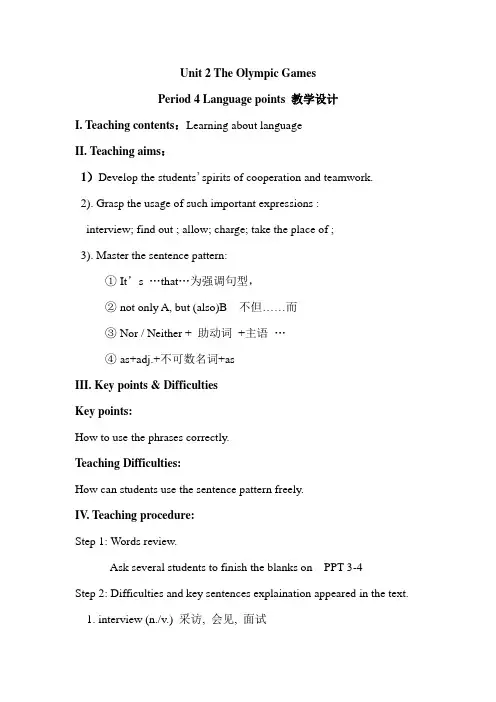
Unit 2 The Olympic GamesPeriod 4 Language points 教学设计I. Teaching contents:Learning about languageII. Teaching aims:1)Develop the students’ spirits of cooperation and teamwork.2). Grasp the usage of such important expressions :interview; find out ; allow; charge; take the place of ;3). Master the sentence pattern:①It’s …that…为强调句型,②not only A, but (also)B 不但……而③Nor / Neither + 助动词+主语…④as+adj.+不可数名词+asIII. Key points & DifficultiesKey points:How to use the phrases correctly.Teaching Difficulties:How can students use the sentence pattern freely.IV. Teaching procedure:Step 1: Words review.Ask several students to finish the blanks on PPT 3-4Step 2: Difficulties and key sentences explaination appeared in the text.1. interview (n./v.) 采访, 会见, 面试interviewer (采访者)interviewee (被采访者)2. find out 查明,弄清情况find sb. out 查处(坏人);识破3. It+be +被强调部分+that/who+句子其余部分。
The lecture of teaching plan for Unit 2 Book 2Good morning, ladies. I am appling for the Qualification Certificate for Senior English Teaching。
Teaching Material(Book 2,unit 2)1、This lesson is about the well-known event —— the Olympic Games. The article concentrates on the history of the Olympic Games:the beginning of the Olympics, the development of the Olympics, the modern Olympic Games and the spirits of the Olympics.2、Th e content of this unit is connected to students’ real life and learning demands. Because the 2016 Summer Olympics in Brazi just ended。
The analysis of students(Senior 1)1、Being equipped with basic English knowledge,like letters,phonetics,pronunciation, words,sentences and grammar,but still need more practice。
2、The senior 1 students have great passion for English and ability of using Englishin class.Teaching aims and demandsⅠ。
高中英语必修二Unit 2 The Olympic Games 教学设计一. 教材分析本单元的中心话题是The Olympic Games.阅读内容是一篇对话题记叙文,通过古希腊作家Pausanias到现代社会采访一位中国奥运志愿者的方式,介绍奥运会的相关知识。
如:奥运会的起源,发展,主题和一些竞赛项目,让学生了解到古代和现代奥运会的异同。
通过对该文的学习,我们不仅要学习课本上有关奥运会的知识,同时也深入了解奥运文化及其精神实质。
其目的是培养学生对体育运动的爱好,增强学生的爱国热情。
二. 学情分析三年的初中英语学习,使学生储备了一定的词汇和英语语言知识,但初中养成的一些学习习惯(如大量机械记忆单词、句型,反复复述课文等)一时还难以改正,而且对高中英语学习的策略和学习环境还很陌生,他们迫切希望获取高中英语学习方法的指导,尤其是在有效的自主学习能力培养方面的指导。
三. 教学目标教学目标(一)语言知识目标1.学习本课新词汇:ancient compete competitor medal host Greece Greek magical interview athlete admit set(n.) slave stadium gymnasium replace prize motto swift wreath replace2.学习本课新短语:take part in, a set of, as well as3.学习本课句型:1).I liv ed in what you called “Ancient G reece” and I used to write about the Olympic Game a longtime ago .2).---How often do you hold your Game?---Every four years.3). It’s in the summer Olympic that you have the running race,(二)语言技能目标1.通过上网查找等课前准备,了解奥运会的历史;2.培养学生根据课文标题预测课文内容的能力,并通过速读确认预测;3.在对奥运史有初步了解的基础上,通过细读文章进一步了解现代奥运的发展过程及现状,从而达到了解奥运历史,学习奥运精神的目的。
Unit 2The Olympic gamesPeriod One能力目标:1. Develop students’ reading ability and let them learn different reading skills.2. Enable students to learn to talk about the Olympic Games.情感目标:1. Arouse students’ great interest in Olympic Games.2. Develop students’ sense of cooperative learning.教学重点:1. Develop students’ reading ability.2. Enable students to learn to talk about the Olympic Games.3. Let students learn to use comparing and contrasting when writing.教学方法:1. Task-based teaching method2. Cooperative learning3. Discussion教学过程:Step 1 lead-in and warming upWhat sports do you like? Do you want to take pert in-the Olympic Games?Step 2 Pre-readingWhen and where will the next Olympic Games be held?Step 2 reading一、Read the first paragraph and fill in the blanks.Pausanias, who was a Greek writer about 2000 years ago, has come on a magical journey on March 18th,2007 to find out about the present-day Olympic Games. He is now interviewing Li Yan, a volunteer for the 2008 Olympic Games.An InterviewInterviewer:Interviewee(接受采访者)Topic二、Look through the passage and then match the questions and answers.1. How often do you bold your Games? a. There are no running races or horseRiding event in winter Games.2. How runners enjoy competing in winter? b. Every country wants the opportunityAnd what about the horses?3. All athletes are from the Greek world? c. A special village is built for them toLire in.4. Where ear all athletes housed? d. Every four year.5. Does anyone want to host the Olympic Games? e. It’s all about being able to run faster,Jump higher and throw further6. Has the olive wreath been replaced? f. Any country can take part if theirDo you compete for prize money too? Athletes are good enough.From the questions and answers, we learn something about modern Olympics and Olympics.三、Scan the text and fill in the table.Compare ancient and modern Olympic GamesItems The ancient OlympicsGamesThe modern Olympic GamesFrequency(频率)Every 4 years Every yearstype Only Summer OlympicsGamesSummer and Olympics GamesEvent FewerAthletes Only men fromCitiesFrom including Places GreecePrizesmotto Faster, higher, further Swifter, higher, strongerthe main ideaIn this lesson, we learn the and between Ancient Olympics and Modern Olympics.四、Answer the following questions1. When pausanias hears that women are allowed to join in, what does he say? How about his feeling, sad, surprised or happy?2. Why does Pausanias think Li Yan should feel proud?3. Why does think people may be competing for money in the modern Olympic Games?Step Ⅳ: Read the beginning and ending of the interview dialogue)An Interviewbeginning: self-introductionStructure middle: questions + answersEnding: expressing thanksStepⅤ: Interview ActivitySupppose(假设)one is Li Yan and the other is PausaniasUseful expressions:My name is…, I am from…,May I ask you some questions about …?How often …?Thank you so much for your time.StepⅥ: SummaryThe Olympic Games are the biggest sports meeting in the world, which Include two kinds, the and . Both of them are every . All countries can takepart if their athletes reached the for their event. Women are not only to join in but playing a very role. A village is built for the competitors to live in. It’s a greatto host the Olympic Games. The olive wreath has beenby medals. But it’s still about being bale to run, jumpand throw.Step Ⅶ: Homework1. Remember to finish the self-evaluation.Period two三维目标知识目标1. Get students to know the structure of the present future passive voice.2. Let students learn the usages of the present future passive voice.能力目标Enable students to use the present future passive voice correctly and properly.情感目标1. Get students to become interested in grammar learning.2. Develop students’ sense of group cooperation.教学重点Enable students to learn how to use the present future passive voice correctly.教学难点1. Task-based teaching method2. Cooperative learning and practice 教学方法教学过程Step 1 Grammar revision1. Review the passive voice1) the present passive voice: am/ is/ are +..p p 2) the present continuous passive voice: am/ is/ are + being + ..p p 2. Fill in the blank with the right form of the verb given.1) Their house (paint) and they have to live with their parents.2) Visitors(request) not to touch the exhibits.3) In some parts of the world, tea (serve) with milk and sugar.4) The news article (write) at present.Suggested answers:1) is being painted 2) are requested 3) is served 4) is being written 3. Do Page 13 Exercise 3 to review the passive voice by making a poster.Step 2 Grammar learning1. Reading aloud and discoveringAsk students to turn back to page 9 to go through Pre-reading and the passage An Interview. Let them pick out the sentences in the present future passive voice and translate them into Chinese.2. Looking and thinkingLet students look at the tense used in the sentences they picked out and think over this question: What is the structure of the present future passive voice?3. Summing upThe structure of the present future passive voice is “shall/ will + be + ”. It is a..p pcombination of the future tense and the passive voice. We also can use the structure “is/ am/ are to be + ”for the present future passive voice...p p Step 3 Grammar practice1. Turn to page 13. Ask students to do Exercise 2 to help the officials make some rules for the Olympic Games, using the present future passive voice.2. Turn to page 50. Ask students to do Exercise 1 and Exercise 2. Check the answers after most of them finish.Step 4 Closing down by consolidation exercisesTurn the following sentences into passive voice.1) They will put up a notice on the wall.→ .2) Have you sent for a doctor?→ .3) I have never heard of such a thing before→ .4) We must take good care of the children here.→ .5) His classmates laughed at him for the foolish mistake.→ .Suggested answers:1) A notice will be put up on the wall.2) Has the doctor been sent for?3) Such a thing has never been heard of before.4) The children must be taken good care of here.5) He was laughed at for the foolish mistake by his classmates.Step 5 Summary1. 一般将来时的被动语态的用法:(1)表示根据计划或者安排将要发生的被动动作。
高中英语必修(2)Unit 2 The Olympic Games_教学设计(教案)教学形式1、任务型教学2、合作学习3、讨论学情分析值得我们注意和思考的是,最基本的课前预习,课后复习,制定学习计划等方面,有的学生显得被动,没有养成良好的预习、复习,有规律制定自己学习计划的习惯,大多数只有在老师的要求下才学习。
对学英语的意义和目的不够明确,缺乏学英语的能力和方法,有些学生没有主动积极学英语的习惯。
以往的教学模式学习理念使学生丧失了学习的自主性,忽视了学生创新精神和实践能力的培养,教学过程以学生被动接受式学习为主要表现形式,缺少学生积极主动的参与,使学生失去了学习的乐趣,把学英语当成了负担。
新的教学理念被越来越多的人所接受,课堂显现出在教师引领帮助下,学生自主学习、主动参与、积极思维、充分发展的主线、做到真正意义上的,把课堂还给学生。
随之而来的,如何培养学生自主性创新学习能力正成为我们努力探索的问题。
本单元以世界性的体育盛会──Olympic Games 为话题,旨在通过本单元的教学,使学生了解奥运会的起源、宗旨、比赛项目以及古现代奥运会的异同。
学会用英语表达自己的兴趣爱好以及如何向别人推荐某一种爱好,同时培养学生对体育运动的爱好。
引导学生发现、感悟将来时态的被动结构的语言规律,培养语感;帮助学生按类别归纳整理,用有效的记忆词汇的方法来掌握与奥运会相关的词汇;学生能够表达自己的兴趣爱好以及如何向别人推荐某一种爱好。
教学目标根据《新课程标准》关于总目标的具体描述,结合高一学生实际和教材内容,我们分语言知识、语言技能、学习策略、情感态度、文化意识五个方面制定相应教学目标:1) 语言知识:双基词汇:学习掌握一些有关奥运会的词汇,如:compete, competitor, medal, Greece, Greek, athlete, stadium, gymnasium等。
掌握文中涉及的其他一些词汇,如: honest, host, magical, interview, admit, a set of, as well as等。
Period 3 Extensive ReadingThe General Idea of This Period:This period is to introduce the students to Greek literature and to help them understand the problems that women had in Ancient Greece.The Greeks had wonderful stories about the Gods and Goddesses who were part of their religion.They believe that these Gods (or Goddesses)would help if they felt sorry for them or if the humans were good people.The Gods did not always help though.They behaved like people who were unpredictable and capricious.To try to get the support of the Gods people had to pray to them and offer them presents.In this story the Goddess Hera,the Greek Goddess of Love (the wife of the chief God,Zeus)was sorry for Hippomenes and agreed to help him.Teaching Aims:1.Enable the students to learn and talk about Atlanta’s story.2.Learn some useful words and expressions:prince,pri ncess,amaze(amazing,amazed),foolish,promise,golden,etc.3.Learn some sentence patterns:(1)I will only be married to a man who can run faster than me.(2)It was so tall that I had to look up to the sky to see it.(3)There was a man called Hippomenes who was amazed when he heard of Atlanta’s rules.Teaching Important Points:1.Enable the students to comprehend the story of Atlanta and get the general idea of the story of Atlanta and something about the beginning of the Olympic Games in the ancient time.2.To know the athlete in the past and the fact that women were not allowed to take part in.Teaching Difficult Point:To understand the content and finish the true or false exercises efficiently.Teaching Methods:1.Skimming to get the general idea of the story of Atlanta.2.Scanning to get detailed information and get to understand the story better.3.Task-based methods to get the students to comprehend the passage and be able to retell the story in their own words.Teaching Aids:1.A tape recorder.2.A multimedia.Teaching Procedures:Step 1 Revision1.Revise the future passive voice.T:It’s getting cold now.Will you bring or buy some thick clothes to school?Ss:Yes.T:In fact we may also say that because it is getting cold now,some thick clothes...Ss:Some thick clothes will be brought or bought.T:That is to say,some thick clothes will be brought or bought.Sometimes we can use future passive voice to express a future action.Remember the form?Ss:Yes.will/be to/being go to be done.T:Very good.Now let’s check our homework to see how well you grasp the grammar.2.Check the homework.(Page 49Ex.1 Choosing the right words and completing the sentences)Step 2 Reading (Page 51)T:Now do you want to know more about the Olympic Games?Ss:Yes.T:Turn to Page 51.This reading material includes three different topics about the ancient Olympic Games.Now let’s read them one by one.What is the main idea of the first part?(After reading)T:Who can answer this question?S1:It describes the opening ceremony of the ancient Olympic Games.T:Can you describe it in details?S2:First the athletes offered presents to Zeus and prayed to win and to wear the victor’s crown.Then they promised to play fairly and not to cheat.T:That is all for this e to the second part.What is the content of the dialogue?S3:It tells us the training life of a successful athlete and the rewards that he got for winning the match.T:What were the rewards?S4:He received many presents from his hometown:free meals,no money problems for the rest of his life and songs written about him.T:Let’s come to the third material.What was the story about?S5:A woman was discovered in the Olympic Games.She aroused some argument.A law was passed that women were not allowed to take part in the Games.T:Good.Look at the form on Page 52.You can read the material quickly and finish the form.(Give the students enough time to discuss the answers to fill in the form on Page 52.)Check the answers.Keys:1.Athletes offer presents to the God,they prayed,see the statue of Zeus.2.The men and young boys.3.Parts of Greece,Athens and Sparta.4.Practise for many hours a day,do a lot of exercise to the sound of music.5.Many pres ents:free meals and no money problems as well as songs about him.6.A woman has been discovered.7.They let her go,but have decided to pass a law that all trainers must be men.Step 3 Reading (The Story of Atlanta on Page 14)1.Leading in—Talk about the pictures on Pag e 14.T:Please turn to Page 14.Look at the first picture.What can you see in it?Ss:Two people.T:Who is the man?Ss:He is the king.T:What about the girl?Ss:She is his daughter.T:Yes,she is named Atlanta and they are talking about their marriage.Now let’s look at the second pictu re.This time what can we see here?Ss:We can see a young man and a fairy.T:Good.The man is named Hippomenes and the fairy is the Goddess of Love.We can see the Goddess of Love is giving something to Hippomenes.W hat is she giving to him?Ss:Some apples.T:Right.In fact she was giving Hippomenes some golden apples.What does golden mean?Ss:It means having the color of gold.T:Good.But why does the Goddess give Hippomenes some golden apples?What are they used for?S1:They are used as food.S2:They are present from the Goddess.S3:They can be used as a large sum of money....T:OK,let’s find out what they really for.2.Getting the general ideaListen to the tape to get the general idea.T:Please listen to the tape carefully to get the general idea.Pay attention to the intonation.If you feel like,read after the tape.T:Who have got the main idea?S4:The story is about Atlanta who races to marry the man who can run faster than her.In order to win the race,Hippomenes asked for help from the Goddess of love.3.SkimmingGet the students to read the story and find the answers to the following questions.(1)Who was Atlanta?(2)What was she good at?(3)Who did she want to marry?(4)How could he Hippomenes win Atlanta?T:Now please read the story and try to find the answers to the following four questions.If you come across any unknown words,try to guess their meanings.(After three minutes.)Now have you finished?Ss:Yes.T:Now who can give us the answers to the questions?S5:Miss,let me have a try.I think Atlanta was a Greek princess.T:Yes or no?Ss:Yes.T:Good.What about the second one?Who can give us an answer?S6:She was good at running.She was not only beautiful but also could run faster than any man in Greece.T:Well done.What about the third one?S7:Sh e wanted to marry a man who could run faster than her.T:Was that possible?Some say yes and some say no.Let’s see the last question.Who can give us an answer?S8:Let me try.He asked for help from the Greek Goddess of Love.The Greek Goddess of Love gave him three golden apples to attract Atlanta’s attention and make her slow down.4.Consolidation (True or false)Get the Ss to do the true or false as a competi tion to check their understandin g of the story.Ifa statement is false,they should tell the reason.1.Atlanta could run faster than any man.(False.She could run faster than any man in Greece.)2.At first Hippomenes understood why men ran against Atlanta.(False.At first he couldn’t understand why men ran against Atlanta.He thought those men were foolish to run against Atlanta.)3.Atlanta was not confident she would win.(False.She was confident.)4.She was so angry that she could not run in the Olympics.(False.The reason for her not being allowed to run in the Olympic was not that she was angry but that she was a woman.She was angry at the fact that she could not run in the Olympics.)5.She made as many men as she could share her pain.(False)6.Her father did not understand her wish to compete.(True)7.He did not refuse her wish to choose a husband in a race.(True)Step 5 AssignmentT:In this class,we’ve learned more about the Olympic Games and talked about a Greek story in the ancient Olympics—Atlanta’s story.After class,I would like you to read the story fluently and retell the story.Step 6 The Design of the Writing on theBlackboardUnit 2 The Olymp ic GamesPeriod 3Languag e Points1.marry vt.A marry Bmarry A to BA get/be married (to B)n.marriageadj.married2.amazed=surprisedbe amazed at sth.be amazed to do sth.be amazed that...amazing=surprising3.promise vt.promise sth.promise sb. sth.promise (sb.)to do sth.promise sb. that...promise n.make/give a promisekeep a promisecarry out a promisebreak a promiseStep 7 Record after Teaching。